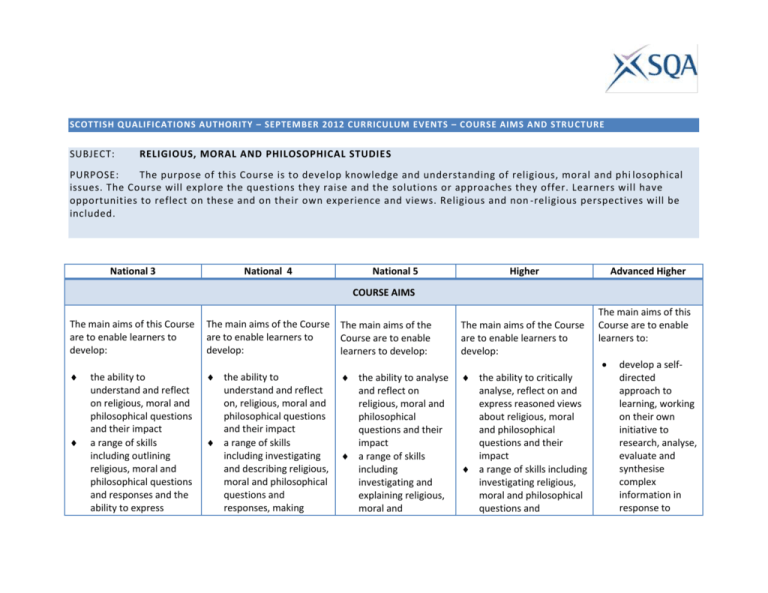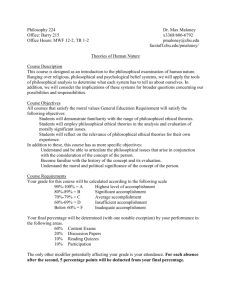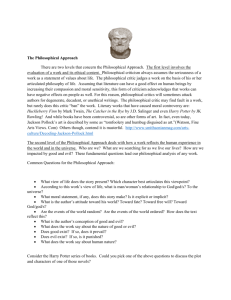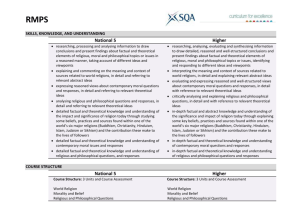Course Aims and Structure
advertisement

SCOTTISH QUALIFICATIONS AUTHORITY – SEPTEMBER 2012 CURRICULUM EVENTS – COURSE AIMS AND STRUCTURE SUBJECT: RELIGIOUS, MORAL AND PHILOSOPHICAL STUDIES PURPOSE: The purpose of this Course is to develop knowledge and understanding of religious, moral and phi losophical issues. The Course will explore the questions they raise and the solutions or approaches they offer. Learners will have opportunities to reflect on these and on their own experience and views. Religious and non -religious perspectives will be included. National 3 National 4 National 5 Higher Advanced Higher COURSE AIMS The main aims of this Course are to enable learners to develop: The main aims of the Course The main aims of the are to enable learners to Course are to enable develop: learners to develop: The main aims of the Course are to enable learners to develop: the ability to understand and reflect on, religious, moral and philosophical questions and their impact a range of skills including investigating and describing religious, moral and philosophical questions and responses, making the ability to critically analyse, reflect on and express reasoned views about religious, moral and philosophical questions and their impact a range of skills including investigating religious, moral and philosophical questions and the ability to understand and reflect on religious, moral and philosophical questions and their impact a range of skills including outlining religious, moral and philosophical questions and responses and the ability to express the ability to analyse and reflect on religious, moral and philosophical questions and their impact a range of skills including investigating and explaining religious, moral and The main aims of this Course are to enable learners to: develop a selfdirected approach to learning, working on their own initiative to research, analyse, evaluate and synthesise complex information in response to National 3 viewpoints basic knowledge and understanding of beliefs, practices and sources related to world religions basic knowledge and understanding of religious, moral and philosophical questions and responses to them National 4 comparisons, and the ability to express reasoned views straightforward knowledge and understanding of beliefs, practices and sources related to world religions straightforward knowledge and understanding of religious, moral and philosophical questions and responses to them National 5 philosophical questions and responses, making comparisons and the ability to express detailed and reasoned views detailed factual and abstract knowledge and understanding of beliefs, practices and sources related to world religions detailed factual and theoretical knowledge and understanding of religious, moral and philosophical questions and responses to them Higher responses, critical analysis, evaluation, and the ability to express detailed, reasoned and well-structured views in-depth factual and abstract knowledge and understanding of beliefs, practices and sources related to world religions in-depth factual and theoretical knowledge and understanding of religious, moral and philosophical questions and responses to them Advanced Higher religious, moral and philosophical issues apply and synthesise skills and knowledge in relation to the role of religion, philosophy and morality in the contemporary world develop in-depth analytical knowledge and understanding of some key philosophical issues found within religion today, and the ways in which religions have responded develop in-depth analytical knowledge and understanding of themes and debates in National 3 National 4 National 5 Higher Advanced Higher religion and ethics develop in-depth analytical understanding of religious experience and responses STRUCTURE, ASSESSMENT AND HIERARCHIES Course Structure: 3 Units World Religion 1) Apply knowledge and understanding of the impact and significance of religion today Morality and Belief 1) Apply knowledge and understanding of contemporary moral questions and responses Religious and Philosophical Questions 1) Apply knowledge and Course Structure: 3 Units and Added Value Unit World Religion 1) Apply knowledge and understanding of the impact and significance of religion today Morality and Belief 1) Apply knowledge and understanding of contemporary moral questions and responses 2) Express reasoned views about religious and non-religious Course Structure: 3 Units and Course Assessment World Religion 1) Apply knowledge and understanding of the significance and impact of religion today Morality and Belief 1) Apply knowledge and understanding of contemporary moral questions and responses 2) Express detailed and reasoned views Course Structure: 3 Units and Course Assessment Course Structure: 3 Units and Course Assessment World Religion Philosophy of 1) Apply knowledge and Religion understanding of the 1) Critically analyse impact and significance arguments from of religion today the philosophy of religion, and their impact Morality and Belief 1) Apply knowledge and and understanding of contemporary moral questions and Researching responses Religious, Moral 2) Evaluate religious and and Philosophical non-religious responses Issues to contemporary moral 1) carry out National 3 understanding of religious and philosophical questions and responses National 4 responses to contemporary moral questions National 5 about religious and non-religious responses to contemporary moral questions In a hierarchy Religious and Philosophical Questions 1) Apply knowledge and understanding of religious and philosophical questions 2) Describe a religious and philosophical question and responses and Added Value Unit: RMPS Assignment 1) Research and use information relating to a religious, moral or philosophical topic or issue Religious and Philosophical Questions 1) Apply knowledge and understanding of religious and philosophical questions 2) Express detailed and reasoned views about religious and non-religious responses to contemporary moral questions and Course Assessment Question Paper and Assignment In a hierarchy In a hierarchy Higher questions Advanced Higher independent research on complex religious, moral or philosophical issues Religious and Philosophical Questions 1) Apply knowledge and understanding of religious and philosophical questions Plus either: 2) Critically analyse a religious and Religion & Ethics philosophical question 1) Critically evaluate and responses complex religious and ethical issues and Course Assessment and relevant Question Paper and responses Assignment Or In a hierarchy Religious Experience 1) Critically evaluate issues involving religious experience and Course Assessment Question Paper and Assignment National 3 National 4 National 5 Higher Advanced Higher SKILLS, KNOWLEDGE AND UNDERSTANDING understanding and commenting on the meaning of sources related to world religions, in basic terms expressing views about contemporary moral questions and responses, in basic terms outlining religious and philosophical questions and responses, in basic terms basic knowledge and understanding of the impact and significance of religion today through studying some beliefs, practices and sources found within one of the world’s six major religions (Buddhism, Christianity, Hinduism, Islam, Judaism or Sikhism) and the contribution these researching and using information to present findings about straightforward, mainly factual elements of religious, moral and philosophical topics or issues in a reasoned manner describing and commenting on the meaning and context of sources related to world religions, in straightforward terms expressing views about contemporary moral questions and responses, in straightforward terms describing religious and philosophical questions and responses, in straightforward terms straightforward factual knowledge and understanding of the researching, processing and analysing information to draw conclusions and present findings about factual and theoretical elements of religious, moral and philosophical topics or issues in a reasoned manner, taking account of different ideas and viewpoints explaining and commenting on the meaning and context of sources related to world religions, in detail and referring to relevant abstract ideas expressing reasoned views about contemporary moral questions and researching, analysing, evaluating and synthesising information to draw detailed, reasoned and wellstructured conclusions and present findings about factual and theoretical elements of religious, moral and philosophical topics or issues, identifying and responding to different ideas and viewpoints interpreting the meaning and context of sources related to world religions, in detail and explaining relevant abstract ideas evaluating and expressing reasoned and well-structured views about contemporary moral questions and responses, in detail and explaining relevant working independently to research, analyse, evaluate and synthesise complex information from a wide range of sources to produce clear, well-reasoned, well-informed and structured written work that demonstrates an in-depth understanding of religious, moral or philosophical issues explaining and applying interpretations of the context and relevance of sources and making well- National 3 make to the lives of followers basic knowledge and understanding of contemporary moral issues, and responses basic knowledge and understanding of religious and philosophical questions and responses National 4 impact and significance of religion today through studying some beliefs, practices and sources found within one of the world’s six major religions (Buddhism, Christianity, Hinduism, Islam, Judaism or Sikhism) and the contribution these make to the lives of followers straightforward knowledge and understanding of contemporary moral issues and responses straightforward knowledge and understanding of religious and philosophical questions and responses National 5 responses, in detail and referring to relevant theoretical ideas analysing religious and philosophical questions and responses, in detail and referring to relevant theoretical ideas detailed factual and theoretical knowledge and understanding of the impact and significance of religion today through studying some beliefs, practices and sources found within one of the world’s six major religions (Buddhism, Christianity, Hinduism, Islam, Judaism or Sikhism) and the contribution these make to the Higher theoretical ideas critically analysing and explaining religious and philosophical questions, in detail and explaining relevant theoretical ideas in-depth factual and abstract knowledge and understanding of the significance and impact of religion today through explaining some key beliefs, practices and sources found within one of the world’s six major religions (Buddhism, Christianity, Hinduism, Islam, Judaism or Sikhism) and the contribution these make to the lives of followers in-depth factual and theoretical knowledge and understanding of contemporary moral questions and responses in-depth factual and theoretical knowledge Advanced Higher reasoned and detailed judgements explaining, analysing and critically evaluating issues arising from the philosophy of religion, responses from religious and other perspectives, and the impact of these issues enquiring into, critically evaluating, and expressing clear, well-reasoned, well-informed and structured views about responses to religious and moral issues in-depth analytical knowledge and understanding of the significance and impact of National 3 National 4 National 5 lives of followers detailed factual and theoretical knowledge and understanding of contemporary moral issues and responses detailed factual and theoretical knowledge and understanding of religious and philosophical questions, and responses Higher and understanding of religious and philosophical questions and responses Advanced Higher religion today through the examination of different perspectives on religious experience






